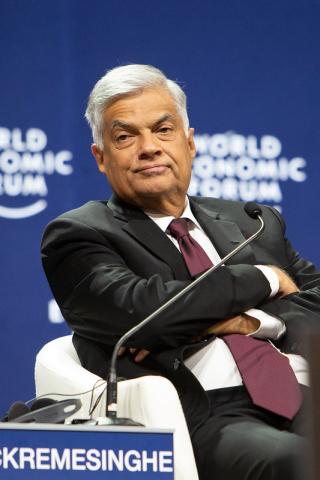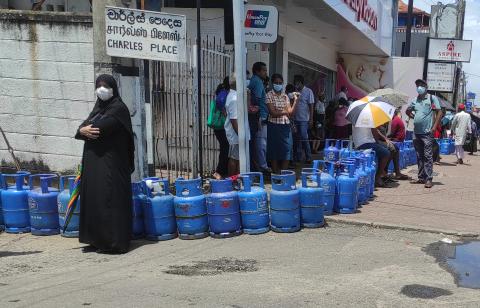Following months of anti-government protests over an unprecedented economic crisis, Gotabaya Rajapaksa of the Sri Lanka Podujana Peramuna (SLPP) resigned as president July 14. The demonstrations had also led to the resignation of his brother, Prime Minister Mahinda Rajapaksa, in early May. Parliament will elect a new president July 20, while an interim all-party government is set to assume power until 2024, or until fresh elections are held. While acting president Ranil Wickremesinghe has the support of SLPP lawmakers and is the frontrunner for the presidency, the Samagi Jana Balawegaya (SJB) party’s chief, Sajith Premadasa, is anticipated to become prime minister. The interim administration faces the challenge of resolving economic problems while preventing potential political strife and renewed demonstrations over the unaddressed demands of the protesters.

"Asia's Geopolitical Outlook", Copyright by World Economic Forum / Sikarin Thanachaiary
Gotabaya Rajapaksa, a decorated army officer from arguably Sri Lanka’s most politically influential family, won a landslide majority in the 2018 presidential elections. However, contentious tax cuts, fiscally unsustainable farming policy changes, and rising external debts to fund alleged vanity projects forced the country to default on its loans in April 2022. The decisions exacerbated the loss of tourism revenue arising from the COVID-19 pandemic, depleting the country’s foreign reserves needed to finance imports. Public discontentment over shortages of essential items has led to progressively worsening service disruptions and protests since March. Additional demonstrations remain possible in the coming months over protest groups’ unmet demands, such as tax reforms, constitutional amendments to abolish the executive presidency, as well as cancellation of agricultural and small business debts.
Colombo’s Galle Face Green is likely to remain the focal point for protests. Potential flashpoints for violent and disruptive demonstrations include delays in political consensus over appointing new leaders and introducing economic reforms, as well as a failure to quickly resolve ongoing shortages affecting daily life. The all-party government will also be inherently prone to instability due to the diverse ideologies and fractured nature of opposition parties in the context of the SLPP’s two-thirds parliamentary majority. Public perception of a SLPP-dominated policymaking process could rekindle anti-government protests, mainly against Wickremsinghe as well as members and known supporters of the Rajapaksa family.

"2022 Sri Lankan economic crisis", by AntanO, licensed under CC BY-SA 4.0
Prolonged unrest and any political disunity could further hamper talks with the International Monetary Fund (IMF) and foreign creditors to ease the economic situation. Concerns over insecurity and shortages of basic items will presumably cause various foreign governments to continue advising against travel to Sri Lanka, precluding the recovery of tourism income as a quicker economic boost as opposed to restructuring foreign loans and reversing agricultural productivity loss. Authorities are likely to extend import controls, rolling power outages, fuel rationing, as well as curtailment of various nonessential services in the coming months. In the absence of fresh stimulus to the economy, enhanced austerity measures could affect essential services, including healthcare and industrial operations. The worsening economic situation could, in turn, prompt violent protests, propagating a vicious cycle of political and economic instability.
Despite a temporary lull in disruptive anti-government demonstrations following sweeping leadership changes, Sri Lanka therefore remains in a precarious security situation due to intrinsic flaws in its economic and political structure. Businesses must ensure contingency plans continue to account for violence, expansive security curbs that may limit movement and telecommunication services, shortages of raw materials and/or manpower mobility, as well as government-mandated operational limits.
Related Intelligence Alerts
Critical | 15 Jul 2022 | 12:09 AM UTC | Sri Lanka: President Gotabaya Rajapaksa resigns amid an indefinite nationwide state of emergency as of July 15
Critical | 14 Jul 2022 | 03:26 AM UTC | Sri Lanka: Curfew declared in Colombo District 12:00 July 14-05:00 July 15
Critical | 13 Jul 2022 | 09:45 PM UTC | Sri Lanka: Nationwide state of emergency in effect as of July 14
Crisis24 provides in-depth intelligence, planning, and training, as well as swift and actionable responses to keep your organization ahead of emerging risks. Contact us to learn more.
Author(s)

Sharanya Anguraj
Intelligence Manager, APAC
Sharanya Anguraj specializes in real-time monitoring and alerting, as well as special reports and analysis, with a focus on South Asia and the greater Asia-Pacific region. She joined Crisis24 in 2019...
Learn More


